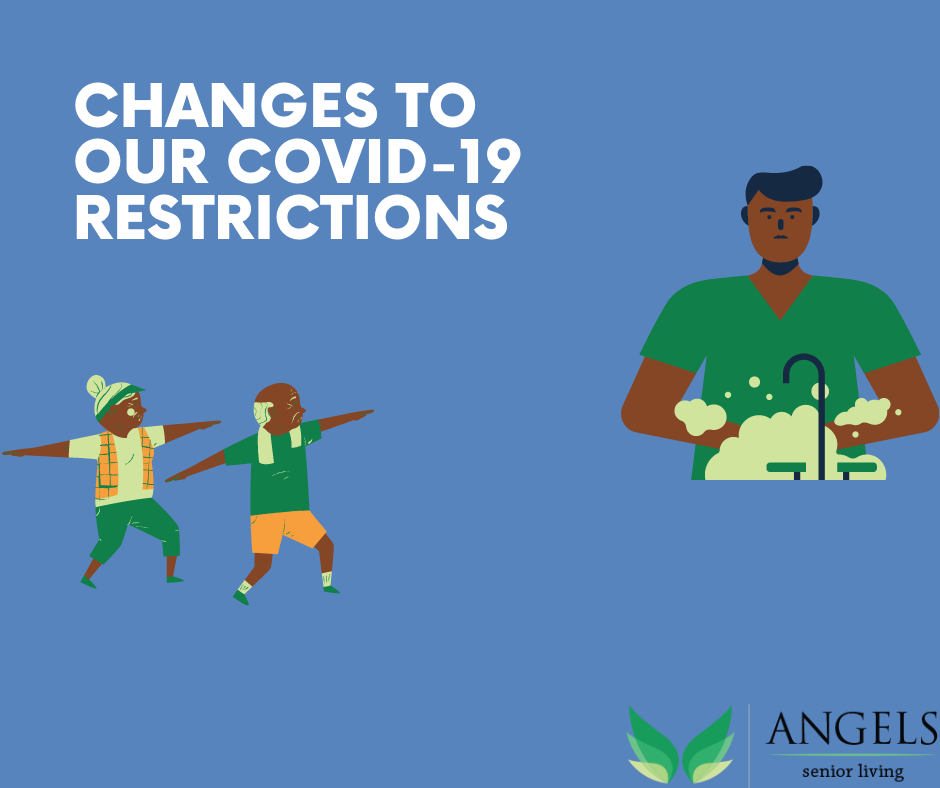Angels Senior Living is proud of its COVID-19 response and shares the optimism of many Floridians and the state of Florida that the worst is behind us. Roughly one-third or 7.5 million Floridians have completed a vaccine series and over two million more have received one dose, according to ongoing reports from the Florida Department of Health. All of our communities participated in the state’s vaccination clinics during February and March, and we’ve seen the results firsthand as fewer residents and staff contract the disease. When they do, their symptoms are much milder, and they’re more likely to recover.
The Centers for Disease Control released new guidance late last week indicating fully vaccinated people no longer need to wear a mask or physically distance themselves in any setting, except where required by states or by business regulation. The state of Florida acted quickly and our assisted living facilities responded too. However, the Agency for Health Care Administration has not authorized us to make significant changes to our COVID-19 response. We are taking a measured approach to accommodate AHCA’s vigilant stance. Vaccinated residents will likely have more freedom to see vaccinated family members, use masks as they feel comfortable, and exit our communities at will. Vaccinated individuals may also be able to enter our facilities with reduced supervision and can seek special accommodations with their individual community. These accommodations will depend on each community and we encourage you to reach out to them.
Highlighting the biggest changes to our COVID-19 prevention
We’ve made several changes to our policies for residents, staff, and visitors informed by the state of Florida and CDC’s new guidelines. These include:
- Reducing deployment of face shields among our vaccinated staff, residents, and visitors
- Welcoming visitors who are vaccinated to join us for events and other activities in our communities on a case-by-case basis
- Eliminating our visitation course in response to reduced requirements from the state of Florida
- Encouraging vaccinated residents to go without their masks if they so choose
- Eliminating two-to-a-table and other dining limitations for residents
- Reducing signage outside our communities
- Ending sanitization mists for most visitors
We’re grateful for everyone’s participation in our appointment booking system and visitation course, which reduced our burden from the state of Florida to educate you on COVID-19 and associated prevention measures. Using our system, we’ve scheduled nearly 7,000 visits and certified almost 1,000 visitors. Now, we are no longer required by the state to educate visitors on signs and prevention of COVID-19. We want to give this time back to you to spend with your loved ones. But we don’t want to compromise the safety of our communities, either, so we’ll be continuing with several measures that have kept you and our residents for the past year.
How we’re continuing to protect your loved ones under new COVID-19 guidelines
Just because many of the dangers of COVID-19 have passed does not mean we’re taking a victory lap. Our staff will continue to employ enhanced screening precautions at the door, including taking temperatures and oxygen levels. We test residents and staff as necessary in the event of positive cases that require contact tracing.
Staff will continue wearing masks and other PPE as appropriate based on the environment. We ask that you continue to wear your mask in our communities, continue scheduling your visits using our portal, and discuss your vaccination status with the staff at your community. Please continue to sign in and get your temperature and oxygen levels tested.
We also encourage you to take this opportunity to get vaccinated! You can learn more about getting vaccinated on the state of Florida’s website. Finishing a vaccine series or receiving the Johnson & Johnson vaccine dramatically decreases your likelihood of both contracting and spreading COVID-19, which keeps our residents, staff, and you safer.
We look forward to seeing you in our communities.






